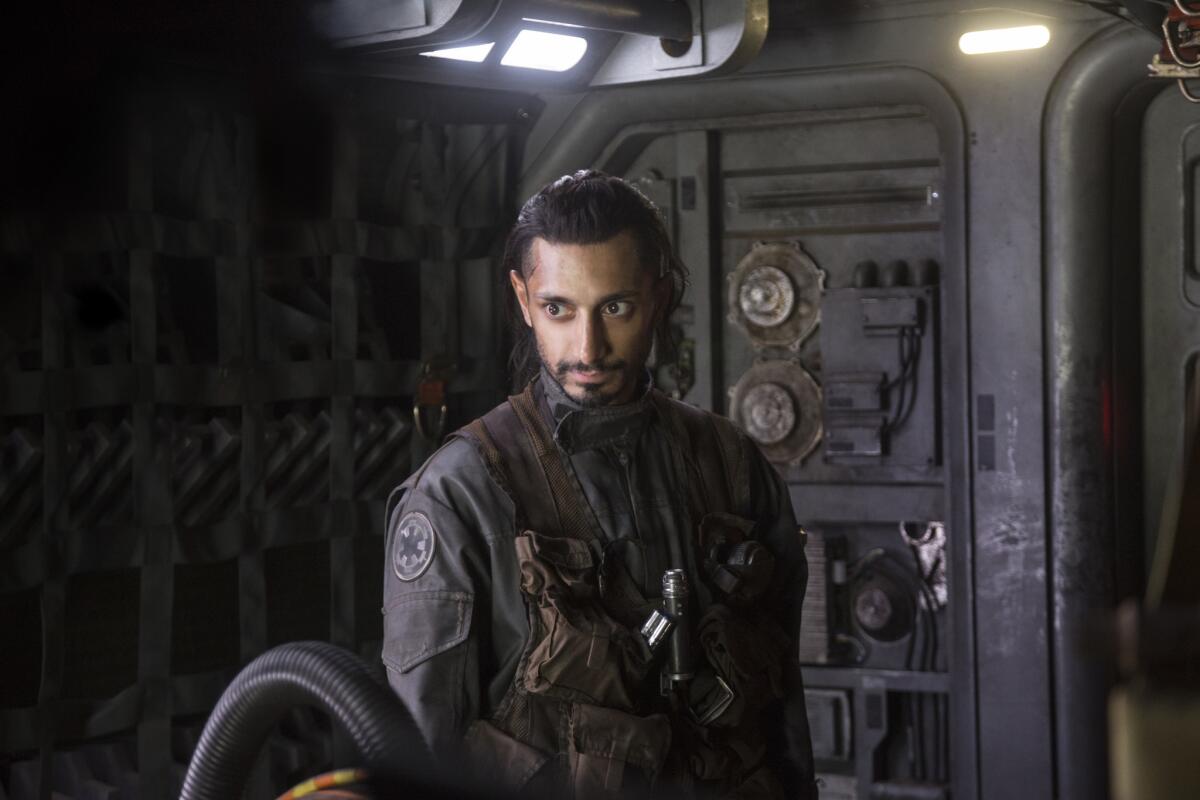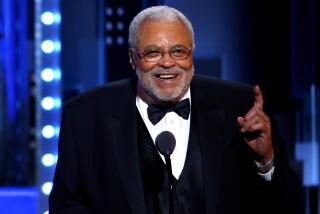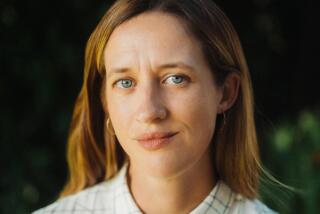‘Rogue One’s’ Riz Ahmed explains how his character shifted entirely while filming the ‘Star Wars’ movie

- Share via
British actor Riz Ahmed is a chatty guy who can drop a freestyle rap on a dime, but the first time he watched “Rogue One: A Star Wars Story,” he was stunned into silence. “That was when it properly sunk in: You’re in a ‘Star Wars’ movie,” he says.
For Ahmed, who plays a cargo pilot named Bodhi Rook who becomes a key player in a secret Rebel mission to steal the Empire’s Death Star plans, costarring in a “Star Wars” movie seems all the more improbable considering that, until recently, most mainstream moviegoers frankly had no idea who he was.
But “Rogue One,” which hits theaters today, is just the capper to a breakout year for the actor that has also seen him earn a supporting turn opposite Matt Damon in “Jason Bourne” and garner critical acclaim — and a Golden Globe nomination — for his starring role in HBO’s crime drama “The Night Of.”
We talked with Ahmed earlier this month at the Lucasfilm headquarters about his unlikely path from childhood “Star Wars” fan to “Rogue One” cast member.
How did you get involved in “Rogue One”? I understand you barraged the director, Gareth Edwards, with audition tapes to try to get the role.
All I had was one scene, so I just thought I’d wring every last bit of possibility of out it. Now, looking back, I realize how insane it was. [laughs]
I was filming “The Night Of” and I got a call one day from my agent, who said, “Gareth Edwards is doing a ‘Star Wars’ movie.” I thought, “That’s not possible — I’ve just seen the trailer to the ‘Star Wars’ movie [‘The Force Awakens’].” I didn’t realize there were these stand-alone movies at all.
Gareth talked me through what the film was and also what the character was. But at the time, the character was actually very different, and the role he played was quite a bit smaller.
The references he gave me for the character were, like, Dustin Hoffman in “Papillon” and Dennis Hopper in “Apocalypse Now.” That kind of combination was intriguing to me. So I started putting myself on tape for this scene, but I am quite obsessive with my work so I just kept going, “Oh, I have another idea.” By the end, I was wearing weird costumes, doing accents, doing, like, 12 takes over a few days.
Finally, Gareth emailed me back and just said, “You don’t need to send me any more tapes. Please don’t do that anymore.” So I just thought, “I’ve screwed it up.”
Quite a while later, he called me from the Star Wars Celebration in Anaheim and let me know he wanted me to be a part of it. Little did I know that he felt I had the role after the first tape. Everything after that was a liability actually. [laughs]
So how did Bodhi evolve once you were on board?
This is my first studio movie that I’ve done, really – I did “Jason Bourne” while I was filming this. What’s interesting to me about the shooting process on these bigger movies is you have more time and more resources so you can have another go at it.
That can be a gift and a curse. There’s something about the kinetic, frenzied scramble of indie filmmaking that doesn’t allow you to stop and think, which is good. Sometimes you can overthink things.
On this film, my character started off as this total other dude, and by the end of the movie, from a combination of what I was doing and what they felt the story needed, he was just a totally different character with a different name, a different job, a different everything — and much more part of the ensemble.
You were still a baby when the original trilogy ended with “Return of the Jedi.” What was your way into “Star Wars” fandom?
I did see the films when I was younger, but I didn’t have a clue what they were about. I was a kid. I was like, 6 or 7 years old, and I’d be a little bit scared, like watching it from behind my hands.
It was just the level of imagination. It kind of inspires a level of childlike wonder in you. To see Jabba the Hutt and see all these creatures and these planets and AT-ATs — it’s hard not to be excited as a kid.
It had a big impact on me. After seeing “Star Wars,” I started writing down names of fake movies and acting them out on my own. So it kind of started me off in my imaginary filmmaking career.
Over the summer, the Internet exploded with reports that the movie was undergoing extensive reshoots and going through major changes. What was it like for you guys to be working with all the speculation and rumors flying around?
I don’t know what all the stories are so I don’t know how accurate they are, but I know there were a ton of reshoots. From what I understand, though, that’s quite normal on these kinds of movies. Even when I think of some of the smaller films I’ve done, like “Shifty” or “Four Lions” — “Shifty” was a three-week shoot and even then we had like four days of reshoots, which proportionately is a ton.
So yeah, there were reshoots, but if people want to read anything into that, I would encourage them to read into it the guts it takes to unpick stitching rather than just try to embroider over it, to make it right. I admire [Lucasfilm President] Kathy [Kennedy] and Gareth and the whole team for having the guts to go, “Let’s re-open this. Let’s do some of this again.” I think it’s because they really care — and hopefully, that’s something that shows when people go see the film.
This is a familiar world that’s been lovingly rendered in a new way, and that’s a really hard thing to do.
You’ve had the kind of run this year that actors dream of. How has your life changed — and how do you see “Rogue One” affecting it?
I just feel really, really lucky and grateful to be able to work on a diverse range of projects: big films, small films, TV shows, doing my music and writing. I’ve always worked under the assumption that no one will see what I do or listen to it or read it. I’ve done it from quite a personal place. In a way, I feel like the best place to create from is a place where you feel like no one is watching. Dance like no one is looking, you know.
So I’m not really thinking about how my life has changed, although so far the changes that have happened have all been quite pleasant. People stopping you on the street to say they connected with your work — that’s a nice thing.
Twitter: @joshrottenberg
ALSO
The genesis of ‘Rogue One,’ the first ‘Star Wars’ you might not want to take your kid to
Review: ‘Rogue One’ adds an uneven but thrilling wrinkle to the mythology of ‘Star Wars’
More to Read
Only good movies
Get the Indie Focus newsletter, Mark Olsen's weekly guide to the world of cinema.
You may occasionally receive promotional content from the Los Angeles Times.











